Feria de Abril (Seville Spring Fair) – 6th to 11th May (2025)
The start of Spain’s ferias always beginning two weeks after Easter. A wonderful opening to Spanish Spring dating back to 1847. Set in the oldest feria ground in Andalusia. A colourful event with a parade of traditional costumes, immaculately turned out horses and Flamenco in the streets.
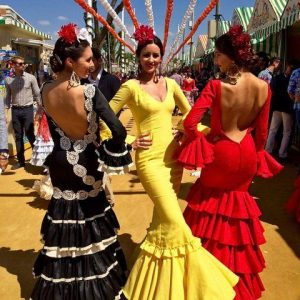
Feria de Abril, Sevilla
Feria del Caballo (Jerez Horse Fair) – 17th to 24th May (2025)
The most famous equestrian event of Andalusia bringing many to the Gonzalo Hontoria park. The Jerez region famous for its sherry, is also one of the most dense populations of Spanish horses throughout Spain. At the feria you will see some of the finest horses being shown at their best performing amongst the crowds. Aligning the streets are many “casitas” (private house/tent of varying size owned by family, groups of friends, or, associations inviting others to eat, drink and dance). This is unlike Seville which is mainly private. The history of the Jerez Feria dates back over 500 years to the commercial livestock fairs during the rign of Alfonso X. A very colourful event which once seen will never be forgotten.

Feria del Caballo, Jerez de la Frontera
Pilgrimage of El Rocio – 3rd to 9th June (2025)
Andalucia is famous for its pilgrimages or “Romerías”, (so called because pilgrims traditionally walked to Rome and they became known as “Romeros”) to popular shrines, around which fiestas are held. The most spectacular is the one devoted to the Virgen del Rocío, called “El Rocio” for short. Nearly a million people make the long journey to gather in a small hamlet of El Rocio, a true spanish cowboy town, in the marshlands of the Guadalquivir River delta (south of Almonte. Here the statue of the “Madonna of the Dew” has been worshipped since 1280.
The pilgrims come on horseback and on foot coming with all ages and from all walks of life. Venturing from all over Spain, transforming the area into a colourful and lively convoy. The climax of the festival is the weekend before Pentercost Monday. In the early hours of the Monday the Virgin is brought out of the church.
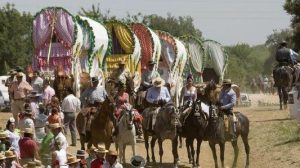
Pilgrimage of El Rocio
From Sanlucar de Barrameda, pilgrams can be seen crossing the Guadalquivir river by boat reaching the Donana National park the otherside.
Sanlucar horse races on the beach – 5th to 7th and 19th to 21st of August (2025)
Sanlucar de Barrameda is famous not only for “Manzanilla wine” but also horse racing which dates back to 1845. This takes place along a 1,800m stretch of beach at the mouth of the Río Guadalquivir during the month of August. A thrilling spectacle where real racehorses thunder across the sand watched by a large number of spectators. There is nothing amateur about this event and you can expect to see spectator stands, bookmakers, paddocks and the winners enclosure. Now an international event where horses from other European countries take part and many famous names amongst the spectators. This year marks 179 years of the history and celebration of these famous races
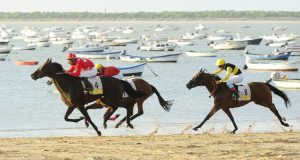
Races on Sanlucar beach
SICAB – 18th to 23rd November (2025)
Salon Internacional del Caballo de Pura Raza Española. International horse show of the Purebred Spanish horse. Always held the third week in November. Begins on a Tuesday and finishes on Sunday. Held at Sevillas FIBES congress and exhibition centre. End of year finals for all ANCCE (the Spanish association and governing authority on the Purebred Spanish horse). Lots to see with many exhibitions of Spanish horsemanship, displays, competitions and equestrian stalls. A wonderful run up event to Christmas.
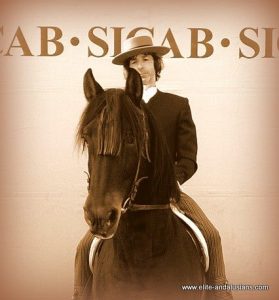
Our beloved Spanish horse expert John Hodgson forever in our thoughts and his stunning PRE stallion Faraon CCXXXIV showing at SICAB in 2016
Sunshine Tour (Circuito del Sol) Vejer de la Frontera – March (2025)
18th to 23rd March – CD13* and CDN2*
A huge Show-Jumping event held at Montenmedio with the stunning back drop of the hill top town Vejer de la Frontera. Thousands of horses and riders participate from all over the World.
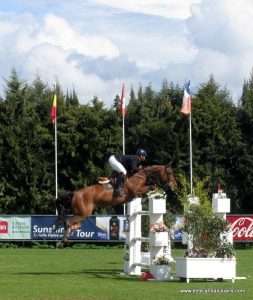
European Sunshine Tour
Saca de las Yeguas, El Rocio, Almonte – 25th June (2025)
The Saca de las Yeguas has remained unchanged for over 500 years. It is one of Andalusia’s oldest and least known traditions. Every year on the 26th of June, local horsemen known as Yegüerizos make their way into the swamps and marshes of the Doñana National Park and round up hundreds of semi-wild horses. The animals are rounded up and brought back to the village of El Rocio and eventually onto Almonte, where they are then cleaned, re-shoed, and put up for sale. Those which aren’t sold are later released back into the wild again.
The celebrations take place over a span of 3 days and precede the festivities to celebrate the local patron saint, San Pedro.
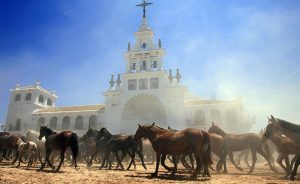
Saca de las Yeguas

